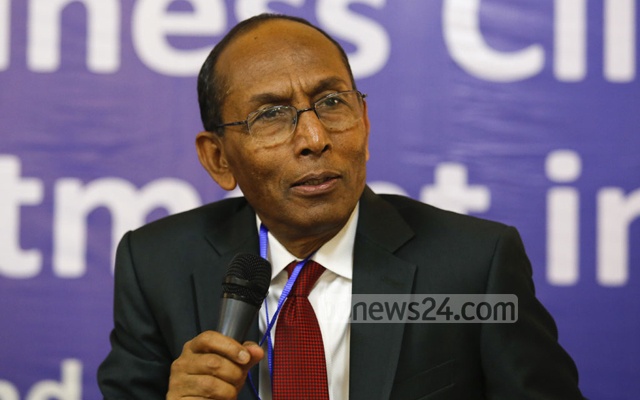The executive chairman of Bangladesh Investment Development Authority (BIDA) has said they have finalised an act to set up an “effective” one-stop service within the state entity to speed up investments.
Kazi M Aminul Islam said the act is waiting for approval from the MPs and it is “likely to go to the current session of Parliament”.
He was speaking on the first day of the BIDA’s two-day strategic workshop with all relevant government agencies and private stakeholders at a Bahubal resort in the north-east Habiganj district on Friday.
BIDA, which was formed through the merger of the Privatisation Commission and the Board of Investment last year, organsied the workshop to devise “action plans” on how to place Bangladesh among the top 100 countries in the World Bank’s ‘ease of doing business’ rankings in order to make it an attractive destination for global businesses.
Cabinet Secretary Mohammad Shafiul Alam, and Principal Secretary at the Prime Minister’s Office Kamal Abdul Naser Chowdhury are also attending the workshop along with their colleagues from the different ministries, World Bank officials and experts, and business leaders.
The executive chairman said massive investment would be needed for Bangladesh to become a developed country as there are many countries said to be in low and middle income country traps.
“To overcome of those traps we need massive thrust – similar to the one we see in a space craft while overcoming gravitational pull.”

Ajit Kumar Paul, an Additional Secretary at BIDA, said evidence showed that “an interoperable one-stop shop makes starting a business easier”.
“In Azerbaijan, a one-stop service has halved the time, cost and number of steps required to start a business. As a result, business registrations increased by 40 percent in the first six months of its operation and 32,000 businesses were registered,” he said.
“Before 2005, Macedonia had one of the most ineffective business entry regimes in Europe. The reform resulted in improvements in the time required from 48 days to only 3 days and a 50 percent decrease in the costs of the procedure thorough one-stop service implementation,” he said.
“The reform also focused on putting in place a state-of-the-art, complete up-to-date and transparent business registry.”
He outlined five fronts to improve regulatory environment for businesses in Bangladesh – to improve regulatory service delivery, improve the country’s doing business ranking, improve capacity for better regulations, institutional strengthening of nodal investment authority and to improve investment policies.
World Bank Dhaka office’s Senior Economist M Masrur Reaz said middle income aspiration is “strongly founded and very realistic, but path ahead is going to be more demanding”.
He said Bangladesh’s economic growth was “impressive”, but other countries such as Myanmar with 8.6 percent growth, India with 7.5 percent, and Cambodia with 7 percent have done better.

Only 58 million of Bangladesh’s 103 million working age people are employed and about 2.2 million new jobs are required every year.
He said the progress in diversifying and improving exports is still limited. FDI is lower than other emerging markets such as Vietnam with $11.8 billion, Philippines with $5.8 billion compared tBangladesh $3.3 billion as of 2015.
He said on average each business regulatory and competitiveness reform is associated with an 0.15 percent increase in growth rate of GDP.
He said India, China and Uganda have grown “impressively” in recent years through investment climate improvements.
The World Bank has placed Bangladesh in the 176th position among 190 countries in its Doing Business 2017 report. Bangladesh was ranked 178 last year.
Despite gaining two spots, Bangladesh lags behind most other SAARC countries, managing only to overtake war-torn Afghanistan.
The study ranks the business environment of a country based on 11 indicator sets: starting a business, dealing with construction permits, getting electricity, registering property, getting credit, protecting minority investors, paying taxes, trading across borders, enforcing contracts, resolving insolvency and labour market regulations.

Bangladesh has advanced one place in the registering property indicator and two places in the resolving insolvency indicator.
But it has plummeted seven places in starting a business, five in getting credit, one in protecting minority investors and three in paying taxes. The other indicator rankings have remained unchanged.
Now BIDA wants to push Bangladesh at least 76 places up in the index within 2020, when the Seventh Five-Year Plan draws to an end.
The executive chairman, earlier, told bdnews24.com that they were following the top countries in the World Bank’s rankings such as New Zealand and Singapore as ‘model countries’ in their efforts to improve the investment climate.
Source: Bd news24










